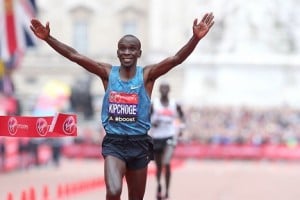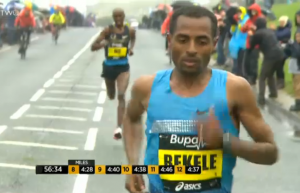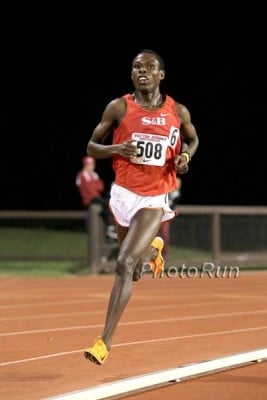Four Thoughts On The 2016 London Men’s Field: Olympic Implications, The Return Of Bekele And Karoki’s Debut
By LetsRun.com
January 19, 2016
The Virgin Money London Marathon announced the men’s elite field for the 2016 race this morning and as usual, it is truly stellar. The planet’s best marathoner, defending champion Eliud Kipchoge headlines the field and is joined by two-time London champ (and 2015 runner-up) Wilson Kipsang, world record holder Dennis Kimetto, world champion Ghirmay Ghebreslassie and 2015 major champs Stanley Biwott (New York) Endeshaw Negesse (Tokyo). In all, the field contains five men who have broken 2:05 and a staggering 16 men who have run under 2:10.
Though we’re still over three months out from race day (April 24), it’s never too early to start looking at the storylines for what is annually one of the world’s greatest footraces. Here are four quick thoughts on the 2016 London men’s field.
1. Update your headlines, everyone: 2016 London is not “The Greatest Field Ever” (but it’s still really, really good)
Whenever London announces their field, we (along with everyone else in the running universe) tend to go a little jealous as their massive elite athlete budget allows them to scoop up almost all of the world’s greatest marathoners. In 2014, we referred to London as “Fantasy Track” and “A Race for the Ages” and last year we asked whether the 2015 London field was the greatest ever assembled for a marathon.
Make no mistake, 2016 London will still be FAR AND AWAY the strongest men’s major of the year, and quite possibly stronger at the top than the 2016 Olympic marathon (as there are no limits on Kenyan/Ethiopian entries). But it doesn’t stack up with 2015 London, as the chart below demonstrates.
| Men | 2016 London | 2015 London |
| # With PR Under 2:04 | 2 | 3 |
| # With PR Under 2:05 | 5 | 8 |
| # With PR Under 2:06 | 8 | 10 |
| # With PR Under 2:10 | 16 | 13 |
We’re not criticizing London’s field. It remains loaded at the top and the depth (16 men with sub-2:10 pbs) is even better than last year. But overall, the 2016 field is slightly weaker than 2015.
2. The return of Kenenisa Bekele
The 2016 London men’s field may be a tiny bit weaker but that doesn’t mean it’s any less interesting.
The last time we saw Bekele, he was dropping out at the 30k mark of the Dubai Marathon in January 2015 after failing to overcome a nagging Achilles injury. He was scheduled to run London last April but couldn’t get healthy by then and withdrew. He eschewed a fall marathon, but by being announced as part of the 2016 London field, it appears Bekele finally considers himself healthy enough to give the marathon another go.
At 33, Bekele should theoretically have a few years of quality marathoning ahead of him, but the tremendous stress he placed on his body during the 2000s, dominating the world in cross country and on the track (frequently doubling on both surfaces) led to calf and Achilles injuries that have plagued him for most of the 2010s. Interspersed have been moments of brilliance — his victory over Mo Farah at the Great North Run in 2013 (LRC Kenenisa Bekele Holds Off Mo Farah In One Of The Most Thrilling Road Races In History); his 2:05:04 marathon debut in Paris in 2014 — but mostly Bekele has struggled to recapture the historic greatness of his prime.
We have no idea what kind of shape Bekele is in. He said in an interview last month that he’s still visiting doctors to treat his injuries, which isn’t encouraging. But he also said he was battling those injuries during his 2:05 in Paris, so the hope is that he can at least get them under control enough to race in London.
2016 is likely Bekele’s last shot at the Olympics (he will be 38 in 2020) and to make it there, he has to run well in London. For Bekele, that pretty much means he has to be the top Ethiopian. Finishing as the top Ethiopian will actually be easier in London than it is in Boston (where two-time Boston champ Lelisa Desisa, Worlds silver medalist Yemane Tsegay and 2015 Dubai champ Hayle Lemi are all entered) but he’ll still have to make it past Tokyo champ Endeshaw Negesse and 2:05 men Tilahun Regassa and Abera Kuma.
It would be a terrific story if Bekele were able to succeed in London and head into Rio with a shot at marathon gold. An Olympic gold at 26.2 would cap a remarkable comeback and swing the GOAT debate between him and Haile Gebrselassie in Bekele’s favor. He’d also join Emil Zatopek and Hannes Kolehmainen as the only men to win Olympic gold in the 5,000, 10,000 and marathon. But for any of that to unfold, Bekele has to run well in London.
| [gravityform action=”polls” id=”308″ mode=”poll” cookie=”1 month” show_results_link=”false” display_results=”true” percentages=”true” counts=”false” ajax=”true”] |
3. As with the women, 2016 London will play a huge role in the men’s Olympic selection process
Both Kenya and Ethiopia will have tough choices to make in filling out their three-man Olympic teams, and given the depth of talent in each of those countries, it’s all but certain that at least one athlete is going to feel that they were screwed out of a spot. Before we start this discussion, let’s take a look at where the world’s top men’s marathoners will be running this spring:
| 2016 Marathon Choice for LetsRun.com’s Top 10 Ranked Marathoners of 2015 | ||
| 1 | Eliud Kipchoge (KEN) | London |
| 2 | Stanley Biwott (KEN) | London |
| 3 | Ghirmay Ghebreslassie (ERI) | London |
| 4 | Lelisa Desisa (ETH) | Boston |
| 5 | Berhanu Lemi (ETH) | Dubai & Boston |
| 6 | Yemane Tsegay (ETH) | Boston |
| 7 | Wilson Kipsang (KEN) | London |
| 8 | Dickson Chumba (KEN) | ?? |
| 9 | Bernard Kipyego (KEN) | ?? |
| 10 | Endeshaw Negesse (ETH) | London |
Five of the top 10 will be in London, and you’ve got to figure that if any of them finishes in the top two in London, they’ll have done enough to earn a spot on the team. But the picture remains very hazy and we’ll only be able to make sense of it after London.
Consider the following scenario:
Sammy Kitwara wins Boston, and then London finishes as follows:
- Kipsang
- Biwott
- Kipchoge
One of those guys won’t get to run in the Olympics. Kipsang, given his pedigree and London win, would have to be on the team. So which of the other three do you leave off? Kitwara, who was second in Chicago last fall and would enter the Olympics as the Boston champ? Biwott, who would have a win in NYC and a second in London? Or Kipchoge, who was indisputably the world’s best marathoner last year but would have lost to both Kipsang and Biwott in London?
That’s both the dream and nightmare scenario for Athletics Kenya (they’d have four in-form studs to choose from but would have to piss one of them off) and it explains why AK considered holding an Olympic Marathon Trials before trashing the idea after 12 days. It also makes London even more compelling than usual, as the top runners won’t just be battling for places in London but for spots on the starting line in Rio.
3. Bedan Karoki debuts
Karoki is a very similar runner (although to a lesser degree) to countryman Geoffrey Kamworor, in that he’s excelled in a variety of distances on a variety of surfaces. Consider that in 2015, he accomplished the following:
- Finished second (behind Kamworor) at the World XC Championships
- Finished fourth in the 10,000 at the World Championships
- Ran 59:14 to win the Copenhagen Half Marathon
The Japan-based Karoki, 25, has also run 26:52 for 10,000 and won the Beach to Beacon 10k Road Race in 2014. Expecting Karoki to replicate Kamworor’s second-place finish in New York last fall is unrealistic. Though Kamworor didn’t exactly flop in the marathon early in his career (he ran 2:06 three times from 2012-2014), New York was the first time Kamworor was fighting for the win in a marathon, and it was his sixth career marathon. It’s not fair to ask Karoki to contend for the win in his debut against London’s loaded field; heck, Mo Farah was only eighth when he debuted in London two years ago.
What’s interesting about Karoki’s debut is the timing. Kamworor is foregoing a spring marathon ahead of the Olympics as he tries to upgrade his 10,000 silver to gold in Rio, likely believing that too much marathon-specific work will dull his speed for a duel against Farah. Karoki finished out of the medals last year in Beijing (he was fourth, 1.94 seconds behind Paul Tanui) but rather than take Kamworor’s approach, he elected to move up in distance this spring despite never before attempting a marathon. When we spoke to Karoki at Worlds, he seemed as if the plan was to still run the 10,000 in Rio. Karoki will certainly be a man to watch in 2016, both for what he is capable of in the marathon and how he rebounds from that marathon in Olympics.




